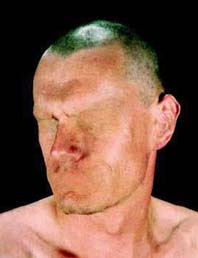L'edicola digitale delle riviste italiane di arte e cultura contemporanea
Virus (1994 - 1998) Anno Numero 10 gennaio 97
AZIZ+CUCHER INTERVIEW
di FAM

Mutation
LOIS KEIDAN
intervista di Franko B
n. 2 febbraio '98
Fear and loathing in Las Vegas di Terry Gilliam
Gianni Canova
n. 4 sett-ott-nov
Jenny Holzer - Interview
by Florence Lynch
n. 10 gennaio 1997
Incontro con Lea Vergine
FAM
n. 10 gennaio 1997
Renée Cox
Interview by Cristinerose Parravicini
n. 14 ott-nov '98
Movimento lento
di Renata Molho
n. 14 ott-nov '98


Aziz+Cucher (Anthony Aziz, americano del Massachussets, e Sammy Cucher, sudamericano di Lima), lavorano insieme, a San Francisco, dal 1990, creando immagini digitali manipolate al computer che preannunciano una trasformazione corporale. Presentano immagini di corpi modificati, corpi che perdono gli 'organi' della comunicazione e dell'espressione delle emozioni, corpi sigillati ermeticamente, che contengono emozioni e sensazioni, che non 'possono più uscire'. Corpi perfetti, corredati e super accessoriati con tutti gli optional di 'serie': pelliccia di visone, personal computer portatile, videocamera; corpi auto-realizzati nel rispetto dei canoni mediali di bellezza, snelli, muscolosi, alti, asciutti, ma privati di occhi, bocche, sesso, privati della sfera emozionale, sensoriale e riproduttiva, una 'serie' di perfezione sterile e sterilizzata. Li incontriamo a Milano, in occasione della loro mostra alla Galleria Photology.
FAM: What is your definition of body?
A+C: We have not given much thought to a definition of Body. We take for granted that it is the seat of our biological identity, and the container - if not the creator - of consciousness. But more than anything it is for us an icon on to which many conceptual and visual metaphors can be inscribed, and therefore it has been the "raw material" from where our work has originated.
FAM: Can the technologically altered body still be called human?
A+C: Of course. Technology is a human product and its interaction with the body is psrt of the enviroment we have created as humanus. In the same way that we
cannot separate ourselves from "Nature", "Culture" -including Technology - springs from us and is by now a "natural" activity. Our definition of what is and what is not human is mediated by a set of cultural constructs, so it is impossible to say that there is one single essential quality that draws the line between humanity and non-humanity. As long as these cyber-bodies are inhabited by human consciousness they will remain human.
FAM: What are the criteria that caracterize an "Unnatural Selection"?
A+C: This is really only a title that we thought would summarize the interplay of different ideas in our work. As we say above, nothing is really unnatural, but there seems to be a purpose and self-consciousness in our ability and desire to change our bodies that is, in its own way, a sharp contrast to Darwin's Theory of Natural Selection, where mutations and the resulting evolutionary
changes are, if not left to chance, ocurring without our wilfull intervention.
FAM: Flesh versus Immateriality?
A+C: It is hard to generalize about this phenomenon. It will be noticed that at the same time that people are making bold statements about the preservation of the flesh, these same people are embracing with a lot of enthusiasm the Internet to establish virtual communites and immaterial realities. We think that perhaps people just want to have it both ways: enjoy the advantages of immaterial connection and reassert the ultimate reality of the flesh. It is important to remember that in a society where everything has been commodified and people have
been reduced to extreme powerlessness, the personal body remains one of the few places where one can assert power and self-expression.
FAM: A cut-off emotional sphere in a perfect - but sterile - body. What are the "exit" (?) mechanism out of emotional paralysis?
A+C: We are not psychologists or even believe that human behaviour can be fully explained by psychological theory alone, much less by the traditional Freudian idea that repression of feeling is inherently pathological. Perhaps a large number of people in our highly industrialized societies have become emotionally numb, reduced to a sort of amnesia of how to feel, and perhaps some day no one will remember how to feel and no one will be the worse for it. Yet, we are also aware of the increasing number of people suffering from all sorts of Neurosis - from Anorexia and Bulimia to Body Dysmorphic Desease - and are constantly startled by random acts of violence - mothers killing their children, people being gunned down at fast food restaurants - which indicate that there is an unresolved psychological conflict that finds its expression in this sort of suffering. Perhaps the only remaining exit mechanism is this sort of - often self inflicted - violent obsessions.
FAM: Is there a merger between the organic and the inorganic?
A+C: Certainly, and we have only just begun to see the possibilities of this interaction. One of the ideas that we want to reflect on with our series "Plasmorphica" is this ambiguity, where we don't know if humans are becoming
more like machines or machines are becoming more human.
FAM: Is the body the last frontier of technology experimentation?
A+C: Very possibly. It seems that we have reached a sort of stalemate in our knowledge of the "exterior" world: there is only so far where Phisics - even Quantum Physics - can go in our understanding of matter. But even this relatively limited knowledge that we have now is allowing for an astonishing understanding of how our bodies work on the genetic and molecular level, which
might hold the key to unthinkable transformations in our identity, our consciousness, and our physical reality.
FAM: How is Identity defined in the contemporary universe?
A+C: We think that by now it is fairly accepted that identity is mostly a cultural construct. We say mostly because perhaps there is such a thing as a basic biological identity, like the immune system in our bodies which can distinguish with incredible accuracy betwen self and non-self. But even this biological given might be facing a change when we think of what is being
acomplished in genetic research.
FAM: Cyberpunk, daily reality or science-fiction?
A+C: Both of them, depending where you are. It is certainly part of our daily life for use in San Francisco (home of Wired Magazine, the bible of the cyber
community) - and perhaps so in the rest of the industrialized world. We cannot forget that the vast majority of people in the rest of the world has a hard time
feeding and clothing themselves, let alone own computers and whatever technological gadgets are required to enter Cyberspace.
FAM: Is the emotional body the revolt against the technological body?
A+C: We're not sure what you mean by emotional body, but our belief is that as our bodies and technology become more and more intertwined, we, will have to
learn to adapt emotionally to this reality.


